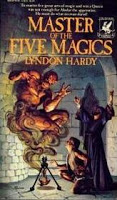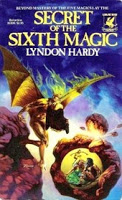 Every once in a while I see references to house rules that emphasize the various “types” of magic. Those types are the parenthetical notes in the Players Handbook in the spell description sections; alteration, enchantment/charm, etc. They don’t really have any in-game effect (well, not until Unearthed Arcana was released, and even then it was half-hearted), and are seemingly included for flavor.
Every once in a while I see references to house rules that emphasize the various “types” of magic. Those types are the parenthetical notes in the Players Handbook in the spell description sections; alteration, enchantment/charm, etc. They don’t really have any in-game effect (well, not until Unearthed Arcana was released, and even then it was half-hearted), and are seemingly included for flavor.
One natural inclination, however, is to think about breaking out magic-users (or, in Adventures Dark and Deep parlance, mages) according to specialty. Thus, we could have rules for conjurers, abjurers, necromancers, etc. Seems like a nice and neat system at first glance, and even Gygax stated that he was considering such a system for his never-completed Second Edition.
Yes, I did intend to have schools of magic based on the types of spells as you note above. The m-u would begin with one specialization, but at various points along the level progression ladder he could opt to add a new field or intensify his capacity in the original one. This was meant to make m-us interesting beyond the point where they could use 9th level spells, any diversion from specialization delaying the advanced spell level possession but adding new lower level spells of a new school.
Hence my own interest, vis-a-vis Adventures Dark and Deep.
The problem comes from the spells themselves. Here’s the breakdown of mage spells by type. These numbers are for the spells as they appear in Adventures Dark and Deep, so there are a few differences from this and the spells that appear in the 1E PH and UA, but the overall numbers should be close.
| alteration | 40% |
| evocation | 21% |
| enchantment/charm | 9% |
| illusion/phantasm | 5% |
| necromantic | 2% |
| divination | 5% |
| abjuration | 8% |
| conjuration/summoning | 10% |

The problem is clear. Specialist alterers are going to have a huge advantage over, say, diviners, since an overwhelming plurality of mage spells (across all levels) are alteration-type spells. Necromancers are hardly given any advantage at all, since only 5 mage spells are classified as “necromantic”, and we don’t even see the first one– feign death— until the 3rd level of spells.
This problem, could, of course, be solved by simply adding more spells to balance out the various types. But this would actually be an enormous undertaking. The total number of first-level spells alone would balloon from 40 to a minimum of 144! And of course if the total number of mage spells are increased so dramatically, it hardly seems fair not to do the same for clerics and druids and the like. So from a purely practical standpoint, that doesn’t seem like a solution.









I like what they did for magic with Warrior, Rogue & Mage – why not come up with a list of common effects for various levels and then allow each school of magic to come up with how the effects are manifested – i.e. a necromantic "cure light wounds" might not be the same as some other variety of cure spell (i.e. perhaps it's a minor drain – conservation of energy – that gets transferred from one person or thing to another for the healing energy)… Just a thought. 🙂
If you detach m-u level from spell level requirements you might be able to manage something. If a 3rd level spell is the lowest spell available, then that is what a 1st level Necromancer gets. When he goes up to 2nd, he gets the next spell (not sure what that is, but he gets it even if it's 5th level).
Looking at it from the other side, then it's cool to play a Necromancer – your first spell is Feign Death, and within a couple levels you've got some really potent spells at your disposal. But a stray arrow can still smoke you, so it's not too unbalanced.
And maybe the Alterators have to exhaust each spell by level until you can start casting next level spells. The upside is that you have a much broader pool to choose from, but advancing in relative power is slower. That also provides some flavor between different schools – Necros are all newbie spellcasters struggling to control these bigass spells (and they typically die young), while there's lots of doddering Alterators (Hedge Wizard-types) who haven't even mastered any 3rd level spells yet.
Why not make Alteration and Evocation spells the baseline standard for all mages, and the other schools be "Specialized"? Alteration and Evocation are in abundance because they are the most common types of magic that all mages learn first; ie, the gateway to more advanced schools such as Illusion or Necromancy. So all mages start with Alt and Evo and once they gain, say, 3rd or 5th level, have gained the requisite mastery to pursue specialization in the more obscure magical talents.
You could combine some of the smaller schools. Divination and Necromancy could go together (diviners know what they know by talking to the dead) enchantment and illusion are a nice pair, and Abjuration could get folded in with Conjuration or Divination/Necromancy. Let Alteration and Evocation stand on their own.
Awesome books you have pictured there. Read those YEARS ago when I was a wee lad – always a trip down memory lane coming here, TYVM for this site. 🙂
I think the key is to beef up some of the other schools, but not necessarily so they all catch up to alteration and evocation. To even out all the others would take a "mere" 45 additional spells or so, spread out over all levels. Since I was going to add some spells anyway, this isn't too many more than I was originally contemplating. Many will be coming from the new spells that were designed for other classes; some of the savant spells could beef up the divination slots for mages, etc.
Thanks to all for helping me think this through (here and on the ADD forums); it doesn't seem nearly as daunting a prospect as it did the other day.
Another possibility, if you're not tied to the idea of sticking with the spell schools as defined in AD&D, would be to re-organise them. So rather than the traditional split between alteration / conjuration / etc, come up with a system of division which ends up with a roughly equal number of spells in each school.
And I like the GG quote a lot, sounds like a very nice way of doing it!
IMHO the AD&D rules had spell bloat.
I think the solution would be to reduce the number of spells, overall, and eliminate redundant spells.
Then again, I tend to favor free-form magic, as found in Ars Magica and Monte Cook's World of Darkness.
I think you're going to be disappointed with ADD, then. More spells a-comin'!
I never quite liked mapping specialist wizards to the spell types in the first place. It seems kind of clinical and overly rational. I'd rather have some division of specialties on a more mythical, evocative level. Say for instance, Alchemy, Invocation of angels and devils (not necessarily summoning, just effects requiring their names or aspects), Summoning of faeries, wild animals and the spirits of the dead, and perhaps one other I'm blanking on. And just go through and split up the spell list that way.
The downside is it's more work for something that's likely going to be campaign specific. Lots of different schema are possible, with the possibility of affecting the feel of the world. It's not as generic as the route D&D took with specialties.